| |
|
22 January 2007 (Monday) |
| |
|
Inaugural
Session
Since its commencement in 2001, the DSDS has emerged as an
important annual event, inspiring leaders and mobilizing public
opinion on the objectives of the MDGs (Millennium Development
Goals). In the opening session of DSDS 2007, speakers noted
that policy formulations are already beginning to stress the
tenuous links between environmental concerns, economic development,
and social justice. Since climate change is an ongoing process
and there are multi-dimensional impacts associated with it,
there is need to develop adequate and appropriate coping strategies.
This, it was felt, will help civilizations adapt better to
climate change.
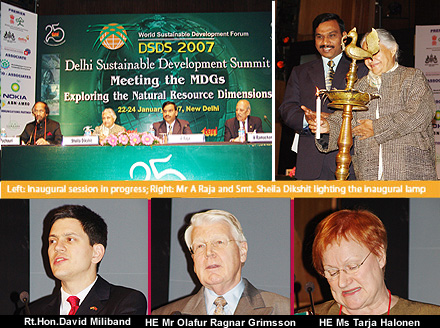
Speakers also pointed out that reduction in the ecological
footprints is an important step towards sustainable development
and should not be construed as a reduction in the standard
of life. The mobilization of science and technology would
have an important role to play in this context; a case in
point being the need to bridge the divide between the developed
and the developing countries.
The panel discussion, which followed the addresses by the
speakers, continued the focus on issues of sustainable development
and climate change. It was acknowledged that policy and technology
combine to create markets where even the deprived can participate.
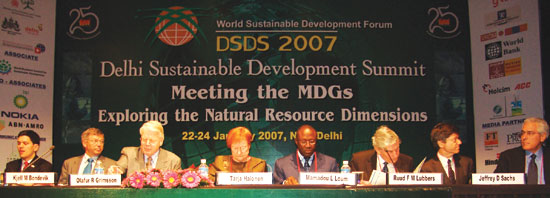
It also emerged during the course of discussion that forms
of governance also impact the sustainability of climate change
policies. A democratic set-up is best suited to further the
sustainable development agenda, as a clear division of roles
between legislation, regulation, and implementation generates
mutual trust and respect between political structure and people.
The session concluded with the opinion that regardless of
the system of governance, political leaders on the whole need
to initiate sustainable dialogues at the national and international
levels for translating climate change policies into visible
impacts on the lives of people.
|
| Session
Panelists |
| Welcome address
 Dr Arcot Ramachandran
Dr Arcot Ramachandran
Chairman, TERI, New Delhi
Presidential address
 Smt. Sheila Dikshit
Smt. Sheila Dikshit
Hon’ble Chief Minister of Delhi, India
Inaugural address
 Mr A Raja
Mr A Raja
Hon'ble Minister for Environment & Forests,
Ministry of Environment & Forests, India
Vote of thanks
 Dr R K
Pachauri Dr R K
Pachauri
Director-General, TERI
Introduction by
 Prof. Ralph J Begleiter
Prof. Ralph J Begleiter
Rosenberg Professor of Communication, University
of Delaware and Distinguished Journalist in Residence, USA
Special address
 One planet living: G8 Gleneagles dialogue by
One planet living: G8 Gleneagles dialogue by
Rt. Hon. David Miliband MP
Secretary of State for Environment, Food and
Rural Affairs, UK
 Commentary
Commentary
Prof. Jeffrey D Sachs
Director – The Earth Institute &
Special Advisor to the Secretary-General of the United Nations,
USA
|
 Panel Discussion
Panel Discussion
Creating a global resolve Statements by heads of governments
/ heads of states
• Rt. Hon. David Miliband MP
Secretary of State for Environment, Food and
Rural Affairs, UK
• HE Mr Kjell Magne Bondevik
Former Prime Minister of Norway
• HE Mr Olafur Ragnar Grimsson
President of Iceland
• HE Ms Tarja Halonen
President of Finland
• HE Mr Mamadou Lamine Loum
former Prime Minister of Senegal
• Prof. Jeffrey D Sachs
Director – The Earth Institute &
Special Advisor to the Secretary-General of the United Nations,
USA
• HE Prof. Ruud F M Lubbers
Former Prime Minister of the Netherlands |
Top
| Keynote
Address: Meeting Asia's Challenge of Sustainable Development
|
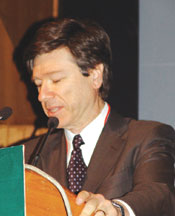 Emphasizing
that economic development should be considered a long-term objective
even for the poorest of the poor, Prof. Jeffrey Sachs expressed
concern over half of the population in Tropical Asia being below
the poverty line. Hunger, malnutrition, non-availability of
safe drinking water, and other basic needs are the major challenges
in Asian countries. These problems demand low-cost solutions
like availability of schools, rural health care, agricultural
inputs, access to water, and safe technologies. Emphasizing
that economic development should be considered a long-term objective
even for the poorest of the poor, Prof. Jeffrey Sachs expressed
concern over half of the population in Tropical Asia being below
the poverty line. Hunger, malnutrition, non-availability of
safe drinking water, and other basic needs are the major challenges
in Asian countries. These problems demand low-cost solutions
like availability of schools, rural health care, agricultural
inputs, access to water, and safe technologies.
Prof. Sachs also focused on the current economic era of great
convergence where the gap between the rich and the poor is
narrowed. The only concern was that while the Asian countries
account for 60% of the world’s population, they make
up for a mere 20% of the GNP (gross national product), which
would increase up to 50% by 2050.
He urged that all countries should join hands to solve the
problem of emissions and proposed a policy framework for a
post-Kyoto UNFCCC that would include agreeing on a mid-century
target of 500 PPM (parts per million); rebate for the poor;
standards for power plants, industries, and automobiles; avoiding
deforestation; better technologies and their judicious transfer;
price on carbon sequestration projects; and a global adaptation
fund for low-income countries. Prof. Sachs identified water
as the primary challenge for the Asian countries. He proposed
the setting up of an IPCC-like body for water.
|
| Session
Panelists |
| Chair
 Mr S Sundar
Mr S Sundar
Distinguished Fellow, TERI
Speaker
 Prof. Jeffrey Sachs
Prof. Jeffrey Sachs
Director - The Earth Institute & Special
Advisor to the Secretary-General of the United Nations, USA |
|
Top |
| MDGs:
The distance yet to be traversed |
| The session began with a report on
the CEO Forum 2007, the curtain raiser event to DSDS 2007. While
presenting the report, Mr Björn Stigson, co-chair of the
Forum, noted that the overriding sentiment that emerged from
CEO Forum 2007 was that ‘business and society’ was
yesterday’s paradigm. Today, it has changed to ‘business
in society’.
Speakers at the session touched upon many aspects of the
MDGs, discussing on the prospects of meeting these on time.
One such aspect is the race to effectively combat and contain
the HIV/AIDS epidemic. This is much more complex in India
than in other regions of the world, because of the stigma
associated with the disease. The possibilities to overcome
the disease can be broadened, if it is fought with classic
management principles upheld, keeping affected communities
central to social and economic activities.
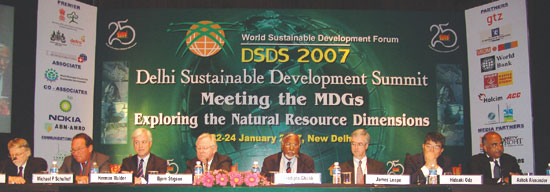
Speakers also focused on MDG 1: eradicating extreme poverty
and hunger. It was argued that poverty reduction could not
be achieved if development continued to shirk sustainable
pathways. The world required perspective and understanding
on sustainable development. The role of the media in bringing
about this perspective was stressed.
Critical issues relating to water were also a dominating
topic of the discussion, especially since more than one-third
of the MDGs can be achieved by solving the water and sanitation
problem. To tackle the water challenges of the day, it was
suggested that businesses, governments, and the civil society
work in tandem at all levels.
Other subjects that were discussed included the urgent need
to move towards sustainable energy choices, greater support
for R&D to monitor the planet’s changing climate,
and the importance of global networking to form a consensus
on sustainable development. |
| Session
Panelists |
Chair
 Dr Prodipto Ghosh
Dr Prodipto Ghosh
Secretary, Ministry of Environment & Forests,
Government of India
A report on CEO Forum 2007 - Business and Society:
Partnering for a Sustainable Future
 Mr Björn Stigson
Mr Björn Stigson
President, World Business Council for Sustainable
Development, Switzerland
Speakers
 Mr Ashok Alexander
Mr Ashok Alexander
Director – India, Bill & Melinda
Gates Foundation
 Dr James Baker
Dr James Baker
Former Administrator, US National Oceanic and
Atmospheric Administration & Consultant, UNESCO &
The H. John Heinz III Center for Science, Economics and Environment,
USA |
 Mr Ashok Jaitly
Mr Ashok Jaitly
Distinguished Fellow, TERI
 Mr James Leape
Mr James Leape
Director-General, WWF International, Switzerland
 Mr Herman Mulder
Mr Herman Mulder
Senior Advisor to the UN Global Compact and
WBCSD
 Mr Hideaki Oda
Mr Hideaki Oda
Councillor to the President, Japan Water Forum
& Member of the UN Secretary General's Advisory Board
on Water and Sanitation
 Mr Michael P Schulhof
Mr Michael P Schulhof
Chairman, Global Technology Investments, LLC,
USA |
| Top |
| Keynote
Address: Turning challenge into opportunity – the business
role in sustainable development |
The highlight of the session was an analysis
of the inherent strengths of the corporate sector that could
be effectively harnessed to achieve sustainable development.
Businesses can make, and in many cases have already made,
significant contributions to sustainable development, but
there still remains untapped potential. Speakers were of the
opinion that the energy and power sectors need to accelerate
R&D to bring cleaner technologies into the production
process. Technologies, such as biofuels, and carbon capture
and storage that have shown promise need to be supported by
business. While costs of such new technologies remain high,
it is hoped that their increased use would have the positive
effect of decreasing the incremental cost of deploying them.
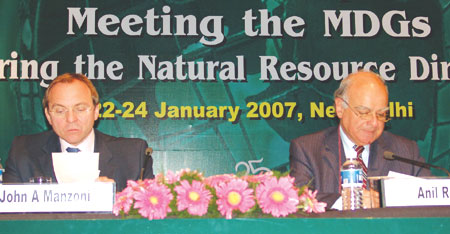
Speakers were also keen to argue that business support for
sustainable development strategies must be, in turn, aided
by a policy environment that encourages innovation and facilitates
corporate involvement in tackling development challenges.
Likewise, the civil society too must form partnerships with
businesses to advance the sustainable development agenda.
The session concluded with the consensus that the corporate
sector needs to look at sustainable development challenges
not as a component of corporate social responsibility practices,
but as a business opportunity. Like in all business opportunities,
first movers will hold the advantage in the coming business
model in which social and environmental sustainability are
integral to the bottom line. |
| Session
Panelists |
| Chair
 Mr Anil Razdan
Mr Anil Razdan
Additional Secretary, Ministry of Petroleum and Natural Gas,
Government of India
Speaker
 Mr John A Manzoni
Mr John A Manzoni
Group Managing Director, BP Plc, UK
|
| Top |
| Climate
Change and Sustainable Development |
Discussions in the session revolved
around the vexing issue of climate change, which is posing
a hurdle to sustainable development. Climate change reflects
a threat that can no longer be ignored or understated. With
a slew of scientific evidence pointing out that the adverse
impacts of climate change are not far away but are already
manifesting themselves, the issue has become too urgent to
be postponed further. Speakers in the session were unanimous
in this assessment, and elaborated on the grave consequences
of climate change that are being observed currently. The rapid
melting of snow, the rise in sea levels, and inconsistent
weather patterns are directly impacting human productive activity
in agriculture and allied sectors. The global scale of climate
change poses huge challenges to every country in the world,
especially those in the developing world, hence impeding the
achievement of the MDGs.

Speakers suggested a dual approach to tackle climate change,
with emphasis on strategies for mitigation and adaptation.
For instance, development aspirations often reflect increase
in energy consumption. Yet, instead of old solutions, governments
and corporations have an opportunity to develop and try new
alternative modes of low-carbon energy technologies. Technologies
such as carbon capture and storage can likewise be tapped
for this purpose. To access financial resources and technologies
to think beyond conventional energy, speakers cited opportunities
presented by international arrangements such as the CDM (clean
development mechanism). Similarly, recent efforts like the
Asia–Pacific Partnership also offer prospects, especially
to the private sector, to play a key role in climate change
mitigation.
Discussions also focused on the role of governments in bringing
about international consensus on climate change and sustainable
development. With climate change dialogue often marked by
disagreements and expectations, countries could partner each
other and foster global cooperation to arrive at common solutions
to a threat that does not distinguish between the rich and
the poor. Speakers called for commitment at the highest political
level to achieve global cooperation. Developing countries
must be provided an appropriate incentive structure to encourage
participation in climate change mitigation.
Broadly, speakers identified integrating action on mitigation
and adaptation into the policy-planning process as the focus
for long-term, country-level strategies to deal effectively
with climate change. Internationally, buttressing long-term
cooperative programmes that seek to strengthen the protections
on the global environment must be given a priority. |
| Session
Panelists |
|
Chair
 Mr Roger Harrabin
Mr Roger Harrabin
Senior Environment Analyst, BBC, UK
Setting the theme
 Mr Yvo de Boer
Mr Yvo de Boer
Executive Secretary, UNFCCC
Speakers
 Mr Howard Bamsey
Mr Howard Bamsey
Deputy Secretary, Australian Department of
Environment and Heritage, Australia
 Ms Preety Bhandari
Ms Preety Bhandari
Director, Policy Analysis Division, TERI
|
Speakers
 Dr Klaus S Lackner
Dr Klaus S Lackner
Ewing-Worzel Professor of Geophysics, Earth
& Environmental Engineering, Columbia University, USA
 Prof. Akio Morishima
Prof. Akio Morishima
Chair of the Board of Directors, Institute
for Global Environmental Strategies, Japan
 Dr Pal Prestrud
Dr Pal Prestrud
Director, Center for International Climate
and Environmental Research-Oslo, Norway
 Dr Camilla Toulmin
Dr Camilla Toulmin
International Institute for Environment and
Development, UK |
| Top |
| Launch
of the India Council for Sustainable Development |
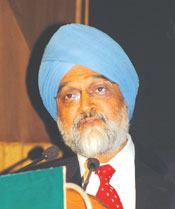 The
ICSD (India Council for Sustainable Development) is a newly
formed platform that seeks to perform an advisory function as
a non-governmental entity and contribute analysis and guidance
to usher in sustainable development in India. The ICSD was launched
at the sidelines of DSDS 2007 by Dr Montek Singh Ahluwalia,
Hon’ble Deputy Chairman of the Planning Commission, Government
of India. Dr R K Pachauri, Director-General of TERI and the
co-chair of the ICSD, introduced assembled delegates to the
members of the body, and gave a broad overview of the ICSD.
Prof. Jeffrey D Sachs, Director, The Earth Institute and co-chair
of the ICSD, spoke about the need for India to plan for its
environmental challenges in terms of decades, and not centuries,
and expressed confidence that the ICSD would be able to make
a contribution in this regard. The
ICSD (India Council for Sustainable Development) is a newly
formed platform that seeks to perform an advisory function as
a non-governmental entity and contribute analysis and guidance
to usher in sustainable development in India. The ICSD was launched
at the sidelines of DSDS 2007 by Dr Montek Singh Ahluwalia,
Hon’ble Deputy Chairman of the Planning Commission, Government
of India. Dr R K Pachauri, Director-General of TERI and the
co-chair of the ICSD, introduced assembled delegates to the
members of the body, and gave a broad overview of the ICSD.
Prof. Jeffrey D Sachs, Director, The Earth Institute and co-chair
of the ICSD, spoke about the need for India to plan for its
environmental challenges in terms of decades, and not centuries,
and expressed confidence that the ICSD would be able to make
a contribution in this regard.
For more information on the ICSD, please visit www.icsusdev.org
|
|
Top |
| Dinner
Session |
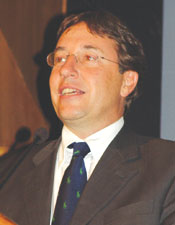 Mr
Achim Steiner, in the dinner address, pointed out two separate
worlds in India today: the traditional India steeped in natural
riches and heritage but lacking in economic power and the new
emerging nation that is globally recognized as a powerhouse
in science, technology, and innovation. He said that the key
to a sustainable future for India lies in bridging the gap between
these ‘two Indias’. He expressed confidence that
India would be able to harness the enormous potential of its
poorer communities and emerge as the ‘hope of the world’
for sustainable development. Mr
Achim Steiner, in the dinner address, pointed out two separate
worlds in India today: the traditional India steeped in natural
riches and heritage but lacking in economic power and the new
emerging nation that is globally recognized as a powerhouse
in science, technology, and innovation. He said that the key
to a sustainable future for India lies in bridging the gap between
these ‘two Indias’. He expressed confidence that
India would be able to harness the enormous potential of its
poorer communities and emerge as the ‘hope of the world’
for sustainable development. A revolution of sorts is occurring
in India, Mr Steiner said, and it is leading to positive outcomes
for the nation’s environment. Through television, magazines,
and the Internet, the concept of environment conservation
and sustainable development is now understood and appreciated
by many ordinary Indians. Returning to his contention that
India is now a source of hope for the world, he also said
that India today has the potential to shape the future through
subtle changes in development trajectories that reflect the
desire to restore a balance between human progress and the
planet’s health. India could take a leading role in
tackling climate change, which requires all the nations of
the world to take collective decisions grounded in united
thought. Mr Steiner concluded by hoping that the year 2007
would be a year of increased momentum in India on issues of
sustainable development.
HE Mr Ahmed Abdullah, Minister of Environment, Energy and
Water, Republic of Maldives, said that Maldives has taken
inspiration from India’s example in sustainable development.
He said that urgent international efforts are needed to save
vulnerable countries like the Maldives. The world must engage
in peace, not war, for sustainable development. |
| Session
Panelists |
| Chair
 Mr A Raja
Mr A Raja
Hon'ble Minister for Environment & Forests,
Ministry of Environment & Forests, Government of India
Guests of Honour
 HE Mr Ahmed Abdullah
HE Mr Ahmed Abdullah
Minister of Environment, Energy and Water,
Republic of Maldives
 Mr Murli S Deora
Mr Murli S Deora
Hon'ble Minister of Petroleum and Natural Gas,
Government of India
|
Dinner Speaker
 Mr Achim Steiner
Mr Achim Steiner
Executive Director, United Nations Environment
Programme, Kenya |
|
Top |
|
|

